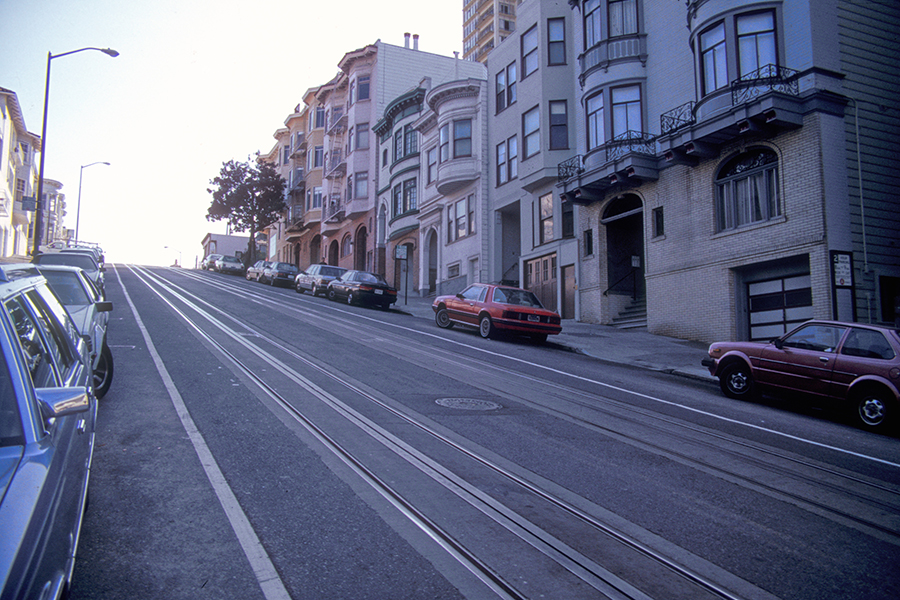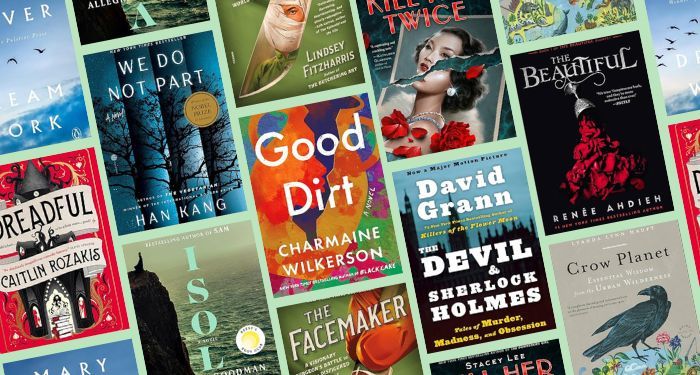
Photograph by Juergen Striewski, via Wikimedia Commons. Licensed under CC BY-SA 4.0.
Michelle Tea once described Valencia as “a snapshot, more or less, of my twenty-fifth year on earth, written not how it happened but how I felt it happened.” It feels right, then, in a numerological sense, to be addressing Tea’s classic twenty-five years after its turn-of-the-millennium publication. One way to do so would be to hail Valencia as an exuberant, hilarious record of a truly unprecedented and mutinous time in lesbian/queer history—the San Francisco dyke scene of the nineties—and by lauding its spot-on testimony to the fashions (“I had big purple hair, a green studded collar, and roller skates. I looked insane”), the locales (Mission dive bars and apartments, the Bearded Lady, a whorehouse in the woods of Marin), the drugs (booze, crystal meth, mushrooms that taste like “a trunk of moth-eaten clothes,” Valencia Street coffee), the pre-internet technologies (zines, open mics, personal ads in newspapers, pay phones, latex gloves), the gender vibes (all over the place, but generally still using she/her pronouns), and the kinks (“Petra was really into the knife. I got the sense that I could have been any body beneath her, it was the knife that was the star of the show”). Such a read would underscore Valencia’s status as one of the most vivid, thrilling documents of its time, while also ensuring that the explosive and inventive culture it portrays isn’t lost to history, as so much queer history, especially of the lesbian, poor, and debauched variety, can be.
But here I want to talk about other things that reading Valencia now makes me think and feel. Namely, I want to talk about Valencia’s achievement in transmitting the conjoined rush of being young, being high, being in love, and becoming a writer—and how that rush feels when these things are pursued all at once, with great abandon. Writers often convey this rush in retrospect, after the dust of an era has settled, or after they’ve removed themselves from a scene (and/or from the substances fueling it). That’s its own trick—and one that Tea has pulled off elsewhere, such as in her great 2016 novel Black Wave. Valencia is something else, maybe something more improbable. It’s a missive sent straight from the mayhem. I still don’t know how she did it.
So, how did she? I’m willing to bet that this passage from Tea’s 2018 collection Against Memoir describes her process at the time pretty accurately: “I remember being inside a nightclub, sitting up on top of a jukebox, scribbling in my notebook by the light that escaped it. All around me the darkness writhed with throngs of females, their bodies striped and pierced, as shaved and ornamented as any tribe anywhere, clad in animal skins, hurling themselves into one another with love. What feeling it filled me with. An alcoholic, an addict, I know what it is to crave, and the need to take this story into my body was consuming. For years I sat alone at tables, writing the story of everything I had ever known or seen.” It’s a kind of miracle, when everyone’s fucked up and fucking, for there to be someone just as fucked up and fucking, but also scribing it all down, and rendering it into literature. And here we have to thank the Higher Power of our choosing that Tea perched atop that jukebox, sat at that bar table, and scribbled. As Tea puts it in a Valencia-era essay titled “Explain,” in a passage that never ceases to make me want to pump my fist: “Why not me. My poverty and the girls that don’t love me and how drunk I got the other night. How I was a prostitute. It seems to be literature when guys write about it, it’s practically become a genre, men writing about their transcendental trips to the cathouse, their orgasms and revelations. Or men writing about women’s lives in general. Straight people writing about queers and white people writing about every other race on the planet. The writing that I love, it’s the Other telling the part that got left out, the truth. Not only a writer and a historian, but a spy.”
Some spies don’t have to labor too hard to throw others off the trail; being a diminutive female is usually enough to keep people from recognizing the genius at hand. “There’s this awful copy shop near my house,” Tea says in “Explain.” “I go there all the time because I’m too lazy to walk up to Kinko’s. The guys at this place are such jerks. I had a bunch of my books and he said, Are Those Your Books? Yeah. You wrote them? Yeah. He makes this suspicious little scrunched-up face. Are You Sure? he asks. He means it. Looking at my dirty fucked up hair and tattoos scrawled up my arms and whatever else he saw. You Just Don’t Look Like You Would Be A Writer. Yeah well keep an eye out for yourself in my next novel, asshole.” And just like that, there he is—first in her essay, and now here. That’s one thing writing can do—seize the means of production. (Asshole!)
Tea makes it look easy to write from the eye of the storm, but let’s pause for a moment to appreciate the rarity. Surely her hypergraphia—a compulsion to write that she has compared to other addictions—helped; as she describes her disposition in Valencia, “Oh, I should be quiet and full of potential like all those still flowers, but I know I am a weed and I’ve got to blow my seeds around the garden.” Yet there’s inevitably a tension between writing and living hard. Sometimes getting wasted makes writing possible (“I always drank while I wrote, and I loved drinking so much that the drinking kept me in my chair, writing,” Tea has said); at other times, it can threaten the whole project, including the project of staying alive. “I could not imagine what would happen to me if I smoked more pot,” Tea writes in Valencia, before adding, in a classic step toward self-abandonment, “I held it to my lips and drew it in.” Being high on love presents a similar conundrum: after filling pages and pages about different girlfriends in Valencia, Tea tells us: “I cannot write when I have a girlfriend.” The mystery of the balancing act goes on.
Maybe one way to think about it is, this balancing act works until it doesn’t, and Valencia emanates from of a time when it was working. For some, it stops working before age twenty-five, but twenty-five seems to me like a pretty typical high mark, before the shit really starts to hit the fan. Denis Johnson’s collection Jesus’ Son—published a year before Valencia—comes to mind here, in part because both Jesus’ Son and Valencia capture so powerfully what Johnson called, in reference to his collection, “the experience of the youthful soul,” and in part because of something Johnson once said in response to an interviewer who asked him if he felt nostalgic for the wild, druggy, desperate days that Jesus’ Son describes. “Well,” Johnson said, “just for the self-abandonment of it. Just sometimes there’s nothing better than lying down in the dirt, being completely hopeless and helpless, because then of course you have no responsibilities, and that kind of appeals to me. But the problem is you can’t do that for long. There’s always a steam roller headed your way.”
The protagonist of Jesus’ Son collides with that steamroller in the book’s pages; in Valencia, the rumble remains in the offing. You can hear it faintly in passages such as: “And Laurel got a girlfriend in Amsterdam, and George got a boyfriend who wouldn’t top him, and eventually Candice did like me, and eventually Iris no longer did, and my older poetry friends from the bar left behind secret addictions as they moved to far away states to dry out, and Ashley got a boyfriend and disappeared completely, and here I sit with my coffee.” Some folks may have begun to move on or move out, but for now our narrator stays put, coffee and notebook in hand. Valencia is a freeze-frame of that ongoingness.
When I imagine an interviewer asking Tea if she feels, twenty-five years hence, nostalgic for the experience of the youthful soul captured so lavishly by Valencia, I think about something she said in conversation with another great chronicler of queer life, Mattilda Bernstein Sycamore. “When I was younger and saw nostalgia in older people,” Tea tells Sycamore, “it really scared me. I never wanted to have that kind of a relationship to my own history. It felt like everyone always thinks that their time was the best time, and it was almost a plan I came up with when I was younger, or a pledge I made to myself, to not get old and boring. Part of that means not being nostalgic.” To honor Tea’s wisdom here, I invite us to read Valencia not as a postcard from a bygone era, but as a shimmering, ever-alive thing, an always-open portal to the kind of youthful soul who vows, as Tea’s narrator does, to “run through the streets in excellent danger.”
Valencia lets us touch this excellent danger whether we have grown away from it, are smack in the middle of it, or never chose to court it. No matter how dangerous or bleak things get, Tea’s narrator remains fundamentally optimistic and questing. Faced with the advent of darkness, she asks, “What would the night give us?” This fundamental buoyancy—which is aided and abetted by Tea’s never-flagging sense of humor—steers us away from moralizing, away from the quicksands of trauma, and toward possibility and gift. “In the mainstream popular consciousness,” Tea tells Sycamore, “certain things are like irredeemably bad. Like getting strung out on drugs is bad, and you’ve lost something if you’ve gotten addicted on drugs. This idea that you’ve lost control, or you’ve lost your mind, or something. Or you’ve lost your virginity, you know how girls always ‘lose’ their virginity. Or if you do sex work, you’ve somehow lost … Any transgression get marked as a sort of loss. And what’s never talked about is what you get from it.” Valencia is all about what you get from it.


 6 days ago
1
6 days ago
1 









 Bengali (Bangladesh) ·
Bengali (Bangladesh) ·  English (United States) ·
English (United States) ·